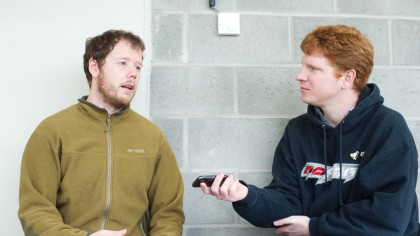Mozilla on Firefox OS: 'what we're doing has a very good chance of working'
We talk to senior Firefox OS engineer Jonas Sicking

Sign up for breaking news, reviews, opinion, top tech deals, and more.
You are now subscribed
Your newsletter sign-up was successful
In Linux Land, every year seems to start with a wave of prophecies that this will be 'the year of the something', usually the desktop. These predictions almost universally turn out to be over-hyped.
However, 2013 could be the exception. With three new mobile operating systems - Firefox OS, Ubuntu and Sailfish - due to launch, maybe this actually will be the year of the Linux phone (or more accurately: the year of the Linux phone that isn't Android).
As we write, the first phones running one of the new systems have just gone on sale: Geeksphone's Firefox OS devices. Our sister magazine Linux Format spoke to Jonas Sicking, who is working on Mozilla's mobile offering, to find out what we can expect…
LXF: How did you personally get started with free software?
JS: It was a long time ago! When Netscape became open source, in 1998, I thought, "Wow, that's really cool." I started looking at where the Mozilla project was, clicking around on its website and I found the source. I was like, "Wow, I understand this!"
I was a web developer at the time and there was one technology that I wanted to use. There was some code to support it, but it wasn't actually working. I thought, "I wonder if I can make it work?" I got more and more involved, and then I got an internship at Netscape. Once I finished school, I joined Mozilla, and I've been working there ever since.
LXF: What's the culture like?
Sign up for breaking news, reviews, opinion, top tech deals, and more.
JS: I really enjoy it, even though I've been there for a very long time. It's very engineering-driven. It's actually quite weird for us to be working with mobile phone manufacturers. When you're doing code on mobile phones, you have to work with partners much more, so we have these external constraints that aren't coming from our own engineers, and that's very unusual for us.
Usually, if you want to work on something at Mozilla, you start talking to people, and generally, if they get excited about your idea, you start doing it. It's a very bottom-up process, and we're very focused on doing the right thing. There's never any demand that "we have to do this because it makes us more money" or anything like that. So it's very engineering-driven and very open. You can go and talk to anyone.
LXF: Did the idea for the phone come from within Mozilla, or is it something that the manufacturers wanted you to do?

JS: It's something that has been an obvious next step for a long time. The browser has slowly developed from being a document-rendering tool into something people write web apps for, so it made sense to think that the browser was now enough of a platform to be an operating system. People were talking about what it would take, and what was needed for Firefox to become an OS, and at some point those discussions turned into "Let's try it!" The actual code started happening about a year and a half ago.
LXF: Are there any plans to create a desktop computer for the OS?
JS: Yeah. Firefox OS essentially consists of two major parts: the apps platform, which allows you to get apps, and gives you this sense of having something that's actually installed; and the pieces needed to make an operating system, such as interaction with the phone and getting Wi-Fi working.
The apps platform is intended to be completely cross-platform. We actually started working on it on the desktop, but then we saw so much interest in mobile in general - I mean, mobile is clearly where things are moving - so we decided to focus on what we could do for apps on mobile.